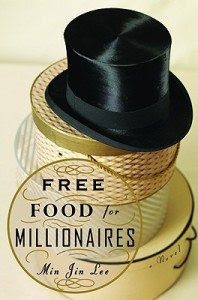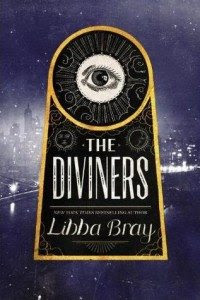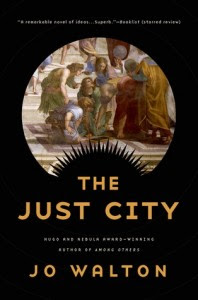Warning for discussion and description of rape scenes and spoilers ahead for Pointe by Brandy Colbert, The Diviners by Libba Bray, The Just City by Jo Walton, and Free Food for Millionaires by Min Jin Lee.
In the eight contemporary (as in, published in the last decade) novels I have read this year, four of them have had rape narratives in them. All of them were surprises to me. I’d pick up the book and in some cases get hundreds of pages into them, thinking I was in for a fun time of domestic drama or supernatural phenomena. Then, out of nowhere, a thoughtless male character pins down a female character with his charisma or strength and insists, “She was into it!” when all is said and done.
In only one of these cases—Pointe by Brandy Colbert—did the choice to include rape play directly into the entire story. In fact, statutory rape is the main thrust in Pointe, chronicling protagonist Theo’s life as her childhood best friend returns after he was kidnapped several years prior. Theo’s rape not only explores the vulnerability of children in a realistic fashion, it represents how tragedy can knock a promising young person off track in a very senseless way. Pointe’s rape narrative eventually morphs into a survival narrative where Colbert maturely and thoroughly explores the consequences that the event had on Theo’s mental health. Ultimately, she  counters those consequences by showing how passion can lead damaged young people—and rape survivors—back to a good path.
counters those consequences by showing how passion can lead damaged young people—and rape survivors—back to a good path.
The other three books? They did not manage the sensitive topic quite as well.
The Just City by Jo Walton perhaps leans on the more excusable side, with its collection of bright men across Western world history. Western world history, of course, remains rather unkind to women. Although many of the men mentioned in the novel are hailed as bright, many of them did not see women as people. Not that modern society—or even a society meant to attempt to achieve an ideal—sees them as such either.
Walton carefully explores the societal implications of Ikaros raping Maia, in that the latter cannot have the former removed from the city out of concern that the social strain would make the other philosophers in the city uncomfortable. Instead, the female philosophers must whisper of the event amongst themselves so that they know whom to avoid. The handling of rape in The Just City is not the problem, so much as the question of, did Walton really need to write it into her already carefully considered book? Does rape have to be the ultimate form of female oppression?
Free Food for Millionaires by Min Jin Lee earns more of the benefit of the doubt initially due to its stronger focus on its characters’ interior worlds. The book is is a contemporary drama highly influenced by Victorian novels, particularly George Eliot’s Middlemarch. Although flawed with a few passages that an editor could have cut from its lengthy page number, the book is a soap opera in literary form and as exciting as real gossip. Everyone cheats on their partner in this book. Everyone struggles through family conflict or money problems or more serious issues like addiction because their will to survive through their pain thrills the reader. So when the rape of Leah Han occurs, it seems that, like in Colbert’s Pointe, it might evolve into a survivor’s narrative. Instead, Lee’s focus slips to the wrong character.
family conflict or money problems or more serious issues like addiction because their will to survive through their pain thrills the reader. So when the rape of Leah Han occurs, it seems that, like in Colbert’s Pointe, it might evolve into a survivor’s narrative. Instead, Lee’s focus slips to the wrong character.
Leah’s first point-of-view chapter occurs more than two-thirds of the way into the book, and not long afterward, her church choir instructor forces himself on her in the back of her car. Her conservative Korean background gives her little knowledge of sex, and she, therefore, blames herself for the incident. The last time we see her, she sobs out a confession to her daughter Casey—the novel’s primary main character—and Casey goes off to play hero and confronts her mother’s rapist. We don’t know what happens to Leah after this point or how she deals with the event, which also leads to a pregnancy and subsequent miscarriage. The uncomfortable and exploitative implication is that Leah’s rape should entertain the reader in the same somewhat cheap way Casey cheating on her boyfriend does. Both acts have deep consequences, but rape more so psychologically than cheating. So why is the latter more thoroughly explored than the former? Also, why does Casey usurp what should be her mother’s story?
However, the most condemnable of the rape narratives I’ve read this year by far belongs to Libba Bray’s The Diviners. With its vapid tale of demonology and magic, and its wannabe-Marvel superhero cast (but set in the 1920s, for no particular reason), The Diviners had already lost its appeal with me by the time Bray reveals that flapper Theta’s backstory included an abusive husband who raped her. This rape happens for about two sentences, and its true impact on Theta is never explored. However, for many chapters previous to the revelation, Bray dawdled by making the character seem sexy and mysterious rather than getting inside of her head.
Apparently, Theta’s rape is given more attention in the sequels, which was The Diviners overarching problem. In every way, from the Buffy the Vampire Slayer-esque concept to the final third of the book where most of the characters didn’t even have roles in the plot, The Diviners was never meant to be its own standalone work. Yet, it has 600 pages of disorganized information distribution and thin storytelling. Somehow, even with all this space, Bray didn’t bother to stop and explore the traumatic rape outside of  “it happened.” In addition, Theta’s ability to immediately trust and form an attachment to her love interest, Memphis, pushes even further the suspension of disbelief and signals that Bray did not give any serious thought to how a character would behave or form relationships after such a violation.
“it happened.” In addition, Theta’s ability to immediately trust and form an attachment to her love interest, Memphis, pushes even further the suspension of disbelief and signals that Bray did not give any serious thought to how a character would behave or form relationships after such a violation.
Some writers believe that rape, like any other act of violence, such as mugging or murder, is something that occurs and, therefore, is “free game” like any other traumatic event. Famous comics writer Alan Moore said in response to a question about the amount of rape in his work, “My thinking was that sexual violence, including rape and domestic abuse, should also feature in my work where necessary or appropriate to a given narrative, the alternative being to imply that these things did not exist, or weren’t happening.” Indeed, the unusual prevalence of rape in the direct market comics industry is what made me lose my taste for rape narratives after years of reading them as practically a genre in fanfiction communities. That is not to imply that rape in comics is any more or less excusable than the rape in contemporary novels or fanfiction, insofar that it just happened to be feminist comics critics who had me realize the number of exploitative rape narratives in seemingly every form of media.
The natural next step to recognition is avoidance, whenever possible. But try as I might, I can’t seem to avoid rape narratives. Given that I’m not a rape survivor, it’s bewildering how anyone who is manages their way through contemporary literature, never mind other media, heavy with similar themes. To counter Moore’s argument, if he and all the female writers I featured above didn’t write about something as  common as car crashes, is that ignoring that they happen? That seems odd, since car crashes happen to nearly everyone. Sure, they don’t have the direct line to societal oppression that Walton quietly points out or always contribute to someone’s personal journey, like in Colbert’s writing. But when it comes to writers like Bray or Lee, how is rape anymore necessary and appropriate in their stories than any other traumatic event?
common as car crashes, is that ignoring that they happen? That seems odd, since car crashes happen to nearly everyone. Sure, they don’t have the direct line to societal oppression that Walton quietly points out or always contribute to someone’s personal journey, like in Colbert’s writing. But when it comes to writers like Bray or Lee, how is rape anymore necessary and appropriate in their stories than any other traumatic event?
The answer may lie in lazy writing, and that’s a satisfying answer coming from The Diviners, a book full of even lazier writing. But it strikes me that Free Food for Millionaires appeared a stronger work than that in most other ways. What compels female writers to include rape even when it doesn’t apply to their stories? Is it a coping mechanism of rape culture, which I suspect is the case for the writers of all that fanfiction I read as a youth? Or is it something much more exploitative than that? Either way, it’s a conversation we may need to have.

